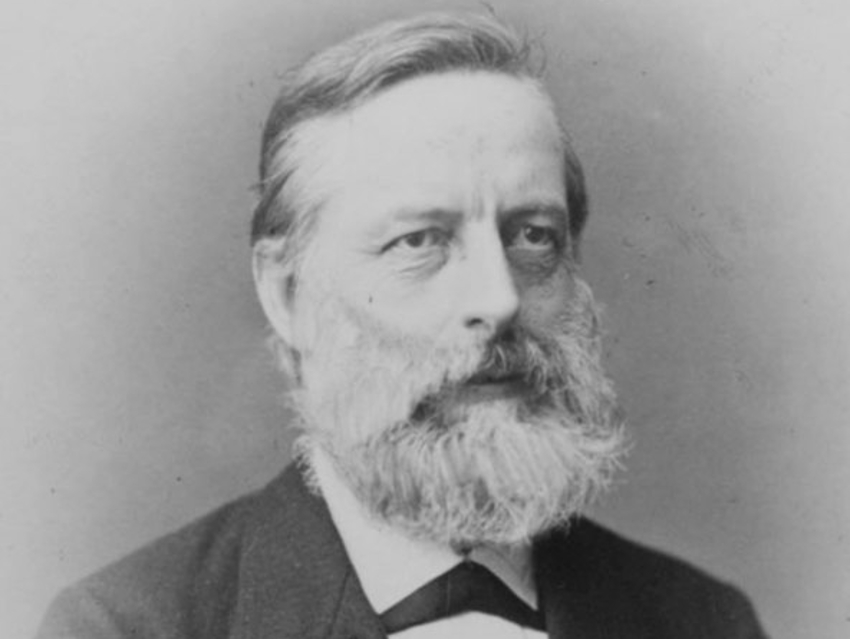Julius Lothar Meyer was born in Varel, Germany, on August 19, 1830, as the son of a physician. He first studied medicine in Zurich, Switzerland, and Würzburg, Germany. During his studies, he developed interests in physiological chemistry, physics, and mathematics. After working on gas analysis with Robert Bunsen in Heidelberg, Germany, he studied mathematical physics in Königsberg (today Kaliningrad, Russia). In 1858, he received a Ph.D. from the University of Breslau (today Wrocław, Poland) for work on the effects of carbon monoxide on the blood.
Meyer then turned his interest to chemistry. He served as Lecturer in physics and chemistry at the University of Breslau after completing his habilitation in 1859. In 1866, he joined the Forestry Academy in Neustadt-Eberswalde, Germany, where he became Professor in 1867. In 1868, he became Full Professor of Chemistry at the Polytechnical Institute in Karlsruhe, Germany (today Karlsruhe Institute of Technology, KIT). In 1877, he moved to the University of Tübingen, Germany, where he served as Professor of Chemistry until his death. Meyer died on April 11, 1895, in Tübingen.
Lothar Meyer is best known for his work on the periodic table of the elements. In 1860, he attended the first international congress in chemistry held in Karlsruhe, Germany, where—among discussions of many other important chemical concepts—the atomic weights of elements and methods for their measurement were standardized. Dmitri Mendeleev also attended this meeting. In the years following the congress, both chemists independently developed the idea that the chemical and physical properties of the elements repeat at periodic intervals when they are sorted according to their atomic weight.
Meyer published an early version of the periodic table containing 28 elements in 1864 [1]. In 1869, Dmitri Mendeleev published a periodic table of all elements known at that time [2]. His work allowed Mendeleev to predict several new elements that would complete the table. In 1870, Meyer published a paper that included a revised version of his table including most of the known elements, which he had developed independently [3]. In 1882, both Meyer and Mendeleev received the Davy Medal from the Royal Society of London for their work on the periodic table.
Lothar Meyer is the answer to Guess the Chemist (100).
References
- [1] Die modernen Theorien der Chemie und ihre Bedeutung für die chemische Statik (in German),
Lothar Meyer,
Maruschke & Berendt, Breslau, 1864. - [2] Ueber die Beziehungen der Eigenschaften zu den Atomgewichten der Elemente (in German),
Dmitri Mendeleev,
Z. Chem. 1869, 12, 405–406. - [3] Die Natur der chemischen Elemente als Function ihrer Atomgewichte (in German),
Lothar Meyer,
Ann. Chem. Pharm. 1870, VII, 354–364.
Sources
- Meyer, Lothar (in German),
Otto Krätz,
Neue Deutsche Biographie (NDB) 1994, 17, 304–306. - Meyer, Julius Lothar (in German),
Peter Haupt,
Biographisches Handbuch zur Geschichte des Landes Oldenburg 1992, 460 . - Meyer, Lothar (in German),
G. Bredig,
Allgemeine Deutsche Biographie 1910, 55, 830–833.
Selected Publications
- Die Atomgewichte der Elemente aus den Originalzahlen neu berechnet (in German),
Lothar Meyer und Karl Seubert,
Breitkopf & Härtel, Leipzig, 1883. - Grundzüge der theoretischen Chemie (in German),
Lothar Meyer,
Breitkopf & Härtel, Leipzig, 1890.
Also of Interest
- Minor Contributors Count as Much as Heroic Discoverers,
Francesca Novara, Eric Scerri,
ChemViews Mag. 2019.
https://doi.org/10.1002/chemv.201900115
Interview with E. Scerri about his fascination for the periodic system, how discoveries are made, and what makes Mendeleev unique - The Periodic System between Chemistry and Physics,
Helge Kragh,
ChemViews Mag. 2019.
https://doi.org/10.1002/chemv.201900040
In the 1920s the periodic system turned out to be a macroscopic representation of the internal structure of the atoms




